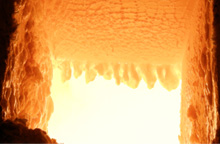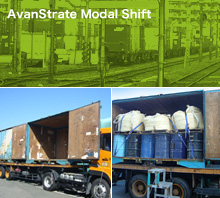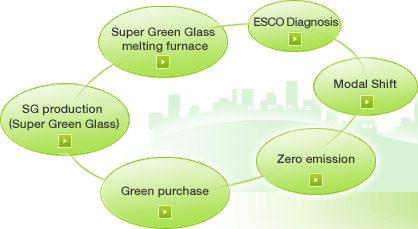SG production (Super Green Glass)
In the past, the process of melting LCD display glass substrates required the use of specific environmental load substances as part of the glass raw material in order to maintain quality. However, we succeeded in establishing a technology that maintains the quality of glass without the use of these substances by re-examining the furnace structure, gas fuel and balance of electric heating supply. Today, we produce and supply glass (Super Green Glass) that does not contain these environmental load substances to meet the needs of the market.
Super Green Glass melting furnace
The process of melting glass raw material requires, strong heat which consumes a lot of energy.
Due to technology innovation, the Super Green Glass melting furnace at our Yokkaichi factory has realized a 10% reduction in carbon dioxide emissions caused by energy use as well as a 7% reduction in energy cost compared to existing furnaces.
The rollout of the melting furnace technology developed in Yokkaichi to overseas factories has enabled us to reduce our carbon dioxide emissions and enhance energy efficiency within the whole group.

ESCO Diagnosis
Carbon dioxide emissions caused by energy use at the Yokkaichi factory in FY 2008 was approximately 29,000t representing a large portion, approximately 98%, of the total greenhouse gasses discharged by the factory. On the other hand, we were able to reduce approximately 7,000t of carbon dioxide emissions caused by energy use compared to FY2005 by consolidating and streamlining our production furnaces and developing innovative technologies for the glass melting furnaces,
Since FY 2009, we have been utilizing ESCO (Energy Service Company) vendors to perform diagnoses and consulting services for potential energy saving measures. These vendors provide comprehensive services in technology, facilities, funds and human resources required for energy efficiency. We are committed to making all-out efforts for energy saving and, together with the small energy saving improvements we make every day, promoting actions to solve global warming.
Modal Shift
In treating specific industrial wastes at our Yokkaichi factory, we are trying to reduce carbon dioxide emissions during transportation with a modal shift to rail freight.
Modal shift means switching to shipping methods that have a smaller environmental burden and using mass transportation systems such as sea freight or rail freight instead of small-volume transportation systems using trucks. It is understood that a modal shift to rail reduces carbon dioxide emissions to about 1/7 compared to truck shipping.
The Yokkaichi factory is located close to freight rail stations and ports and gives us a geographical advantage to promote modal shifts. Because of this, we are making efforts to conserve the environment from a logistics point of view, conducting comprehensive reviews of reductions in environmental burdens through modal shifts in addition to costs of consigning the treatment of industrial wastes and transportation.

Zero emission
At the Yokkaichi factory, we define the term "zero emission" as a recycle ratio of close to 100% in order to abolish the use of industrial waste landfills and simple incineration and we are striving for the achievement of zero emission. In order to reduce the consumption of nonrenewable natural resources existing on the earth and support the formation of a sustainable recycling-oriented society, we are promoting zero emission by recognizing industrial wastes produced by our business activities as a useful resource, strictly segregating and collecting wastes from each of our production process and searching for new waste treatment vendors. Since FY 2007, we have been achieving a recycle ratio of 100% for industrial wastes and accomplishing continued zero emission.
Green purchase
At our Yokkaichi factory, we are conducting green purchasing for general office supplies. Green purchasing means reviewing the necessity of the purchase itself, considering not only the quality or price but also the environmental effects, and purchasing products with a smaller environmental burden from suppliers who themselves are committed to reducing their environment burdens. We are actively promoting green purchasing as the first step towards changing the structure of our society, which is facing various environmental problems caused by mass production, mass consumption and mass disposal, into a sustainable, recycling-oriented, new carbon society structure with a smaller environmental burden.







